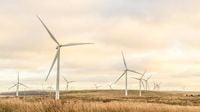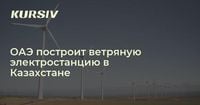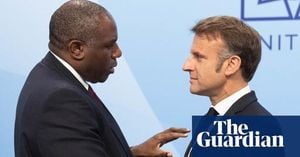Kazakhstan and the United Arab Emirates have embarked on an ambitious green energy initiative that promises to reshape the renewable energy landscape in the region. On April 30, 2025, both nations solidified their commitment through an agreement to construct two major wind farms in Kazakhstan's Zhambyl region, a project that could significantly boost the country’s energy capacity and sustainability efforts.
The agreement was officially ratified by the Mazhilis, Kazakhstan's parliament, which has paved the way for the development of these wind energy projects. Each wind farm is set to have a capacity of 500 megawatts (MW), complemented by a state-of-the-art energy storage system capable of storing 300 megawatt-hours (MWh) of electricity. This innovative approach combines renewable energy generation with effective storage solutions, ensuring a reliable power supply even during periods of low wind.
One of the key features of the projects is the construction of a 125-kilometer power transmission line with a voltage of 220 kilovolts (kV). This infrastructure will facilitate the efficient distribution of the generated electricity to the national grid. The energy storage systems are particularly noteworthy, as they can provide approximately 30% of the power for up to two hours, a crucial capability in managing the inherent variability of wind energy.
As part of the agreement, the parties have established a fixed electricity price for a period of 25 years. This long-term pricing strategy is expected to attract stable investments, fostering the growth of the green energy sector in Kazakhstan. Such a framework not only secures financial commitments but also encourages the development of further renewable energy projects in the future.
According to Minister of Energy Erlan Akkenzhenov, the wind power plants are anticipated to generate around 3.4 billion kilowatt-hours of electricity annually. This output is projected to significantly reduce carbon emissions by approximately 2 million tons per year, contributing to Kazakhstan's climate change mitigation goals.
In addition to the environmental benefits, the projects are expected to provide electricity to about 300,000 homes in southern Kazakhstan, thereby enhancing energy access for many residents. The investment from UAE-based Masdar, a leading renewable energy company, underscores the international collaboration aimed at advancing sustainable energy solutions.
Masdar's involvement is particularly significant as it marks the introduction of energy storage systems in Kazakhstan for the first time. These systems are essential for improving the resilience of the energy grid, especially in light of increasing demands and the need for reliable energy sources.
The components for the energy storage systems will be sourced from Chinese manufacturers Sunny and Envision, with plans for the production facilities to be established within Kazakhstan. This local production initiative is expected to create jobs and stimulate the economy, aligning with the broader goals of national development.
Despite these promising developments, the latest statistics from the Ministry of Energy indicate a slight decline in the share of renewable energy sources in Kazakhstan's total electricity generation. In the first quarter of 2025, renewable energy accounted for only 5.93% of the total, down from 6.43% in 2024. This highlights the ongoing challenges the country faces in transitioning to a more sustainable energy mix.
As Kazakhstan moves forward with these wind energy projects, the collaboration with the UAE represents a significant step towards achieving energy independence and sustainability. The successful implementation of these initiatives could serve as a model for similar projects in the region, demonstrating the potential of international partnerships in addressing global energy challenges.
In conclusion, the joint efforts between Kazakhstan and the UAE to develop wind energy infrastructure not only aim to enhance energy security but also reflect a growing commitment to combating climate change. As these projects progress, they will be closely watched by other nations looking to invest in renewable energy solutions.





